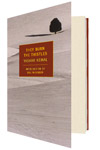Turkish writer Yashar Kemal is best known for Memed, My Hawk (1955), the first of four novels starring the title’s good-hearted brigand. They Burn the Thistles concludes this quartet. Originally published in 1969 and situated in the early twentieth century, the novel feels much older than either period. The tone is anachronistically free of self-consciousness and irony; the setting, too, is untouched by the “bourgeois class” that Kemal, perennially rumored to be a Nobel Prize candidate, finds “rotten.” Peasants plow and herd, individualism is minimal—some quotes are attributed to entire villages—and loyalty never wavers.
Not that we’ve landed in some prelapsarian idyll. When our hero first appears in Memed, My Hawk, he is a traumatized adolescent, running through fields of thistles to escape Abdi Agha, the landlord who terrorizes his tenant farmers. Later, after attempting to kill his enemy, Memed flees the village and joins a band of outlaws in the mountains. Like a more revolutionary Robin Hood, he dreams of offing cruel landowners and liberating the peasants. The people, in turn, develop an unbreakable loyalty to the legendary rebel. Unbeknownst to most of his admirers, he remains a “puny boy” who cries in his sleep. (Kemal has a refreshing, modern sense of humor about his hero.) Still, the popular awe is not misplaced. When visited by righteous anger, Memed subtly transforms, and the “needlepoint of light” in his eye dispels all doubts. Bullets seem to avoid him, while his own aim is mysteriously unerring.
As They Burn the Thistles opens, Memed is on the lam, having at last succeeded in assassinating Abdi Agha. His mission supplies the story’s adventure, but the subplots, animated by mighty passions, are more poignant and indelible. Kemal describes emotions in simple, direct language. The lovely Seyran, falling for Memed, “was aware that within her something had stirred… that she was being agitated by mixed feelings which resembled pity, love, motherliness and friendship.” Adem, a landlord’s lackey, receives orders to track down a magnificent stallion, but the creature appears to possess supernatural powers, vanishing at will. Adem longs for his wife, but, befuddled by his own tenacity, can’t give up his pursuit. “Is this horse my father, my limbs, my eyes?” he shouts.
Kemal’s characters are unable to check their emotions, which seem to assail them from external sources. These passions may lead to ecstasy or ruin, but either way there’s pathos in the characters’ vulnerability to them. Even indecision, far from a namby-pamby state, consists of comically wild swings between opposite certainties. It’s a world of excessive life, and the vitality is not limited to human fervor. Kemal also turns his sensuous attention to nature—sometimes pages go by without reference to a person, as he inventories the snakes and beetles and barberry shrubs.
Born in 1922 to a Kurdish family, Kemal has spent time in prison for his activism, and his leftist politics informs his work. To his credit, Thistles reads more like a juicy folktale than a treatise about the exploitation of labor. Finally, though, the message is unavoidable, even didactic: despite the Sisyphean frustrations of fighting injustice, “We struggle.” The richness of Kemal’s storytelling has earned him the right to preach a little—indeed, one of his strengths is his guilelessness. It’s the same reason he gets away with explicit reports of his characters’ feelings. What would come off as too bald in a lesser writer often seems here like radical honesty.





